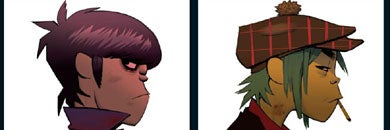Your support helps us to tell the story
From reproductive rights to climate change to Big Tech, The Independent is on the ground when the story is developing. Whether it's investigating the financials of Elon Musk's pro-Trump PAC or producing our latest documentary, 'The A Word', which shines a light on the American women fighting for reproductive rights, we know how important it is to parse out the facts from the messaging.
At such a critical moment in US history, we need reporters on the ground. Your donation allows us to keep sending journalists to speak to both sides of the story.
The Independent is trusted by Americans across the entire political spectrum. And unlike many other quality news outlets, we choose not to lock Americans out of our reporting and analysis with paywalls. We believe quality journalism should be available to everyone, paid for by those who can afford it.
Your support makes all the difference.In each year, there are just a few albums that catch the public mood and become mainstays of the charts. This year's mood seemed to be set by Michael Parkinson, with Katie Melua, David Gray, Jamie Cullum and Robbie Williams joining Blunt and Coldplay as chart fixtures, with the increasingly horsey Madonna doubtless cantering up on the rails following her solo audience with the wrinkled chat-show host.
The other big seller came from the undisputed band of the year, Kaiser Chiefs, whose Employment boasted the wall-to-wall singalong hooks that soundtracked the year, as well as being the advance guard for a great year of homegrown indie-pop from the likes of The Magic Numbers, The Coral, British Sea Power, Goldfrapp and Hal.
By Mercury Prize time, however, the Kaisers were so ubiquitous that the judges opted for the novelty of the androgynously-voiced Antony & The Johnsons - thus ensuring that the Chiefs managed to dodge the career-killing Mercury bullet. Whether Antony's charms endure for a second album remains to be seen; certainly, despite a massive promotional push, the follow-up album from previous winner Ms Dynamite failed to ignite much interest. Can Robbie Williams be allowed to win next year, please?
Outside the more corporate territory, however, 2005 was a vintage year for rock and pop, with quite the best haul of quality music for a decade or two. Where my annual compilations usually take up two or three CDs, this year's couldn't be squeezed on to four, and whatever your favoured genre, there was plenty to satisfy the most ferocious of appetites. In the wake of The Libertines, there was abrasive new punk-pop from the likes of The Dead 60s, The Others, The Ordinary Boys and the huge homemade successes of Hard-Fi and Arctic Monkeys. Late on in the year, Babyshambles finally delivered on a little of Pete Doherty's non-pharmaceutical reputation with their debut album.
On the urban front there were excellent albums from Common and Kanye West, while the growing maturity of UK hip-hop glimpsed on several compilations was affirmed by striking releases from Roots Manuva and The Mitchell Brothers. And if folk-rock is your thing, there was a bumper crop of acoustic creativity from Devendra Banhart, Laura Veirs, José Gonzalez, Espers, King Creosote, Tunng, Willy Mason and Bright Eyes - the last became one of two acts (Ryan Adams was the other) to release three albums in a single year. Elsewhere, a new strain of psychedelic prog-pop became improbably fashionable again, courtesy of Sigur Ros, Viva Voce and especially Arcade Fire, whose Funerals wound up high on many magazines' best-of-year lists.
My choice for album of the year would be a toss-up between Ry Cooder's Chavez Ravine and Sufjan Stevens' Illinoise, both intelligent, large-scale explorations of American psycho-geographical themes. Along with splendid new works such as Gorillaz' Demon Days and Kate Bush's Aerial, they established 2005 as the year that the concept album returned to pop with a vengeance.
This wasn't the only way the clock seemed to have been turned back to the Seventies. Reunions and revivals littered the year: Cream returned to the Royal Albert Hall, scene of their farewell concert three or four decades earlier, for a get-together prompted by Ginger Baker's medical bills; Pink Floyd confronted the unthinkable and reunified for a literally show-stopping finale to the otherwise mostly tedious Live8 concert in Hyde Park; the Stones celebrated Charlie's new-found lease on life with another tour and their best album for ages, a feat Paul McCartney and Stevie Wonder failed to emulate.
Further evidence of the old hands' renewed grip on their careers came from Brian Wilson, whose Glastonbury performance, watched by reportedly the largest Glasto audience ever for a single act, made a fitting Sunday-afternoon finale to an event otherwise dominated by a White Stripes show of breathtaking audacity, from the beautiful, co-ordinated set design to their devastating cover of Son House's "Death Letter". And virtually the whole of September was turned over to pop's venerable bard Bob Dylan, with Martin Scorsese's No Direction Home documentary accompanied by all manner of DVD, CD and book releases.
On the business front, despite the huge success of iTunes, the record industry continued its paranoid struggle with the demon of file-sharing, persecuting children for illegal downloads and treating staff, journalists and purchasers alike as potential pirates. Record companies' protestations that these measures were being taken to somehow "save" music were revealed as bogus by their willingness to continue favouring larger corporate retail clients with the kind of advantageous pricing deals that will ultimately kill off small independent retailers, traditionally the lifeblood of a healthy, diverse music industry. Pretty soon, it'll just be Madonna and Robbie at Tesco, and tough luck if you want something a little more outré.
The Five Best
Sufjan Stevens: Illinoise
Ry Cooder: Chavez Ravine
Hal: Hal
Kaiser Chiefs: Employment
Gorillaz: Demon Days

Join our commenting forum
Join thought-provoking conversations, follow other Independent readers and see their replies
Comments